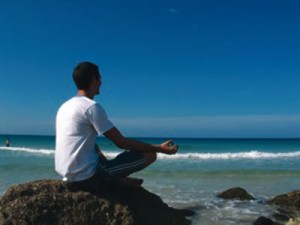Crossing the road to solitude
 Last Mothers’ Day I received a card which asked, “Why did the Mum cross the road?” The answer, “No one could tell really. She was mumbling to herself about peace and quiet. She circled the block a couple of times and came back a lot happier.”
Last Mothers’ Day I received a card which asked, “Why did the Mum cross the road?” The answer, “No one could tell really. She was mumbling to herself about peace and quiet. She circled the block a couple of times and came back a lot happier.”
I have always been a person who needs quiet times in my life. It is a personal foible that we have needed to factor into our marriage and family life. When our children were small and it all got too much, I would get in the car and drive to the park and sit with myself a while…just thinking really. Now, like any foible that is taken up and lived well, it has become a bit of a joke, hence the card from my dear husband.
I know now that it was not solitude I craved back then but a break from social interaction. Later on, when pastoral life became so busy after the Second Vatican Council, I sought solitude for the same reason, though not from the rigours of family life but the rigours of community building.
I was interested to read in the Sunday Star Times in May an article entitled, Me myself and I. The article speaks of the benefits of solitude and is at pains to point out that being alone does not equate to loneliness. A clinical psychologist “is certain solitude is about to have its day in the sun.” The piece is light-hearted, and as we would expect, it comes at solitude from a scientific angle. I went from reading it to my filing cabinet and fished out Thomas Merton’s Notes for a Philosophy of Solitude. This is not a light-hearted piece of writing and a person would need some knowledge of the inner life, and some experience of solitude and silence to get anything out of it.
God is able to speak to us through both these articles. I would look at an article like Me myself and I and ask myself what it is that Catholic lay life can add to the scientific take on solitude that makes the experience of solitude holy. As followers of Jesus Christ we are charged with living the type of lives that speak to the world of lasting peace and happiness. It would not do to bang on about what Thomas Merton says about solitude. We are not charged with educating the world but gracing it with Christ’s presence In this task the sacraments help us enormously as we try to live solitude in conjunction with the more active parts of our daily lives.
Although it does not specifically say so Prayer in the Busyness of Life, the document put out by the bishops, addresses our need for solitude. The interest in meditative and contemplative forms of prayer in the Catholic Church at present comes out of the catholic, innate need in human life for solitude. Taking up this need and living it well gives our active lives a holy dimension and a durable energy which is not exhausted by busyness. Each baptised person needs to spend some time alone in prayer talking to God as a friend and at the same time continue to be part of the social interaction of family and pastoral life. When we think of solitude we must think of going to visit a friend and wise counsellor. 
Of course the world does not think of God when it thinks of solitude. The title of the newspaper article indicates that it is to be thought of as a purely human experience. At the end of the first paragraph comes this sentence. “Research is showing that the benefits of time spent alone can be profound - it boosts creativity, mood, empathy and memory, and decreases stress.” Nearer the end the clinical psychologist says of solitude, “But also just the self-awareness side of it, that you actually get a stronger connection with yourself.” The author then adds “in turn creativity feeds into happiness.” But the most telling sentence of all for me was this from a woman who was interviewed for the article. When asked what being alone meant to her she replied, “It means just being in my own head, you know? And inside my head is a really cool place…and it, oh gosh –it’s so hard to describe. I have complete control over it. I don’t have control over other people, they act in unpredictable ways.”
The secular emphasis on the individual’s pleasure in solitude is not a bad thing. It is just that it is a pleasure that fades rather quickly once social interaction begins again. A Catholic seeking solitude would want something deeper and more lasting than passing pleasure out of solitude. Such a person knows, either explicitly or implicitly, that in solitude he or she is seeking a living knowledge of God that is not forthcoming in more socialised aspects of pastoral life.
Seeking solitude to learn about love is a sign of spiritual maturity. A Catholic mother does not enter into solitude to gain control over her life but to learn how to love all those unpredictable things about the other people in her life. The move to the maturity of “self-awareness” and “stronger connection with yourself” means exposing her own weaknesses to God if she is to have any hope of lasting inner peace and overall happiness. The break-through in acceptance of other people’s weakness comes with the dawning revelation of her own “unpredictable ways”. The mother interviewed in the article does not seem to have this knowledge.
Jesus Christ tells us that the greatest commandment is to love God and the second is to love neighbour as self. The three loves are inseparable, equally difficult, equally important in a mother’s life. The fruitfulness of her love of neighbour hinges on what she finds out about God’s love and about her ‘self’ in solitude. Love of ‘self’, of one’s weakness is a crucifying experience. Not all are prepared to go the whole hog so to speak and that is just fine. In this experience a little bit of self-love goes a long way and if each person does a little bit the world will be graced with that love.
Solitude is not a devil-free zone. It is as hard to love God in solitude, to find that lasting peace and happiness. As we know from Christ’s experience in the desert, the temptations to give into pride are as real when we are alone as when we are in company. He did not fail to love his Father and conquer pride. His life and the lives of the saints tell us that the best way to begin to love one’s self and to keep love of God at the centre of one’s life is to pray when we go into solitude.
Sometimes, when this prayer has been going on a while people call it ‘prayer life’. It is a useful term in that it describes a ‘life’ beyond formulaic prayer in which God is the prime mover in a personal relationship. The Church teaches that private prayer is never private, how could it be if God is involved? But in the beginning it feels private in a spiritual sense and that feeling works for the friendship not against it. “Back to reality” is a necessary experience as a mother moves in and out of solitude.
The search for knowledge of love that is not forthcoming in fellowship is lead, I think, by women in the Church who need a bit of piece and quiet to recollect themselves. (Think of Mary at the Incarnation, or Mary Magdalen at the Resurrection.) Today the innate need for solitude may well be expressed in a Mother’s Day card, a scientific article or a holy man’s thoughts. The presence of solitude in life will not go away. It is at the end of the day, a presence that seeks us, not the other way around. The world senses this better than we do in the Church and we should take notice of that sensitivity.
 Entries(RSS)
Entries(RSS)